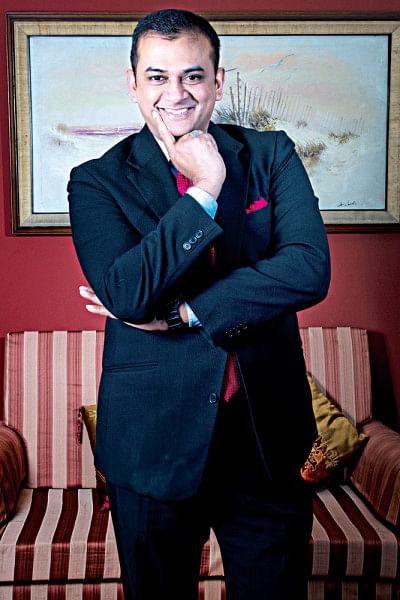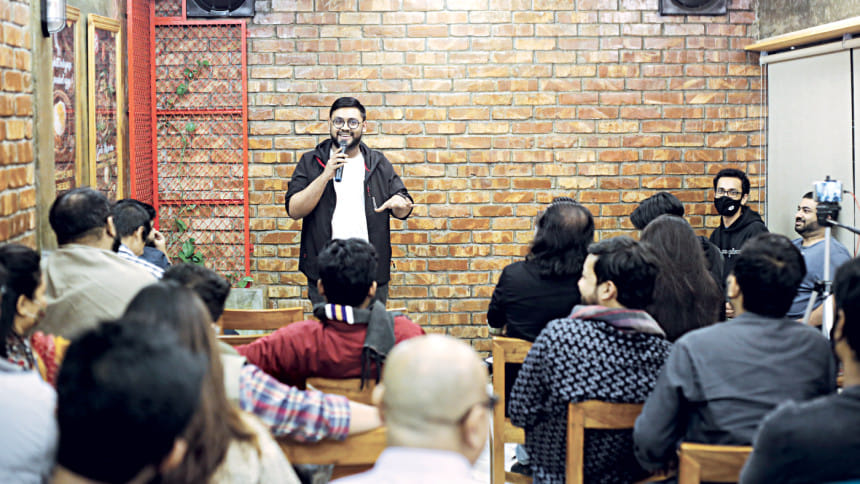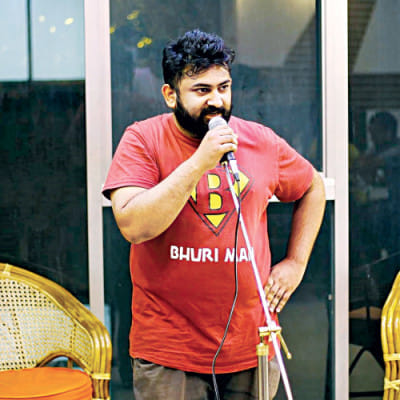Stand-up comedy: A niche industry with limitless potential


"Bring your work to Naveed's Comedy Club's cafe. No charge! Stay as long as you want to. No purchase necessary. We have everything here: a great workspace, WiFi, printers, projectors, whiteboards, even a stage to practice your presentations," announced ace comedian Naveed Mahbub, in a recent video on social media.
A forerunner in the country's stand-up comedy scene, Naveed Mahbub has extended his comedy club's space and encouraged office-goers to relax at his premises, a unique way to get entertained in the city amidst the generic restaurants, sporadic musical concerts, and ever-diminishing space.
Stand-up comedy in Bangladesh is gradually flourishing with the emergence of young comedians. Popular acts, including the likes of Amin and Ashik, Ananda Mazumder, Bipro and Zahaan Brishty, have already carved a loyal fanbase amidst the young urban demographic.
However, there are major problems that stand-up comedians face, which stands in the way of these young talents turning the "scene" into a full-fledged industry. The lack of sponsorship and proper venues, financial instability, and freedom of speech make it still a niche industry in Bangladesh.
Comedy duo Amin and Ashik organised a country-wide tour, along with Ananda Mazumder and Rafsan Sabab last year, which got massive responses from the audiences.
"We started off with a 35-seater in Mirpur, and within two months, we covered all of Dhaka just by sheer support of the fans of our podcast," added Ashik.
The tickets to all the shows were sold out, yet Amin and Ashik believe that they could not find "commercial" success.
"We went to Rajshahi with our own money, and we didn't have any sponsors. We used the money that we received from our sponsored content on social media," said Ashik.
Fortunately, we did not have to pay for the venues, as the restaurant owners let us do the show for free. They kept 50 percent of the revenues of the tickets. With respect to how much money we earned, it was a break-even project."
"We need to alert the mass audiences of our existence first. Financially, stand-up comedy will need the next five to ten years to be commercially viable. We even had some potential sponsors, but when they gave us guidelines, we said 'no' to them, as they clearly went against our freedom of speech," said Amin.
"It boils down to the comedian. A sponsor is someone who practically sits there with free money, and wonders what benefits they can reap. For example, if I invest 100 taka on a comedy show, will I get back 150 taka?" explains Naveed Mahbub, who explained that a sponsor looks at not just a comedian, but anyone with a level of brand equity.
"Amin and Ashik have carved out a niche, and many young people love them. Many brands are also relying on them for advertisement. So, the question is, are we good enough?" added the comedian.

The potential for expansion in stand-up comedy is there, however, the lack of female performers remains a concern.
Zahaan Brishty, a talented comedian, opened up about her struggles of being a woman in a male-dominated industry.
"There is a misconception that women aren't funny, and that we can't perform as well as men," she said. "The major hurdle we face is the timing of shows. Comedy shows are usually held at 9 PM, which is not at all a safe hour for women to travel alone."
Zahaan further explained that women are scrutinised more, when compared to men, in this industry.
"It takes a lot of courage to come up on stage and perform. Women constantly feel that they are going to be judged, and thus they tend to shy away from doing comedy," said Naveed. "I know plenty of wonderful women who are genuinely funny, but are reluctant to come on stage. I hope that the general audience can be more accepting towards female comedians and let them shine on stage, instead of trolling them."
Another major problem that stand-up comedians face is the lack of proper venues. There are instances when restaurant owners don't prefer to let comedians perform, as the audiences might be conservative or want to have a quiet dinner.
Fortunately, Naveed's Comedy Club and Stand Up Dhaka arrange platforms for the young artistes to perform without any hesitation.
Ananda Mazumdar, a "stammering" comic, started doing shows in 2018, but was not able to do many in the last two years due to Covid-19.

"I am not really good at anything else. Stand-up comedy is something really close to my heart, and I am really thankful to Naveed Mahbub for his club. If we didn't have a venue, there would be no audience to begin with. The more shows we have, the more exposure we will get to make it a more financially viable industry," said Ananda.
"Stand Up Dhaka was formed in 2017. We created this platform to help comedians get more shows, and organise dates for them," says Bipro, a well-known comedian and founder of Stand Up Dhaka. "We have a team of capable photographers, event managers, graphic designers, social media managers, a treasurer – we have everything that a club needs," he said.
"Till date, we have had around 33 shows, among which 31 were housefull. We are getting unprecedented support from the crowds. This is an art form which needs patronisation, which has to come from the audience or corporate sponsors."
"We charge BDT 100 for open mics, and BDT 300 for feature shows. In the open mics, we spend more money than we actually earn. However, the loss is worth it, because it adds to the pool of performers and encourages others to try out new sets," added Bipro.
Formed in 2010, Naveed's Comedy Club has its own dedicated venue for the stand-up comedians to perform at one place.
"In Naveed's Comedy Club, we host shows twice a week, and sometimes thrice a week. Here, you will see comedians from all walks of life. I remember I met a comedian who was the chef at a restaurant, and was doing wonderful comedy. There is also this one kid who came from Narayanganj, and he really had to think several times before coming to the show because he was trying to figure out how he was going to pay for his bus fare. In truth, a lot of good comics are coming," said Naveed.
He also explained how it is difficult to arrange funds for promising stand-up comedians.
"It costs a lot of money just to run the comedy club, and I am paying this money out of my own pocket. Comedians get to come and perform in an air-conditioned room, and I have invested a lot of money to build it. The ticket revenues can't even cover up the electricity bills, which pile up at the end of the month. The stage is there for free and enthusiastic comics can come and do the shows," added the comedian.
Stand-up comedy in Bangladesh is still at its budding stages, growing steadily over the years. Many young talents have been able to create a strong fan base with their viral content and popularity on social media. It is a niche craft with limitless potential, one that the new generation of comedians are insistent on exploring.
The author is Reporter, Arts & Entertainment, The Daily Star. Email: [email protected].

 For all latest news, follow The Daily Star's Google News channel.
For all latest news, follow The Daily Star's Google News channel. 



Comments